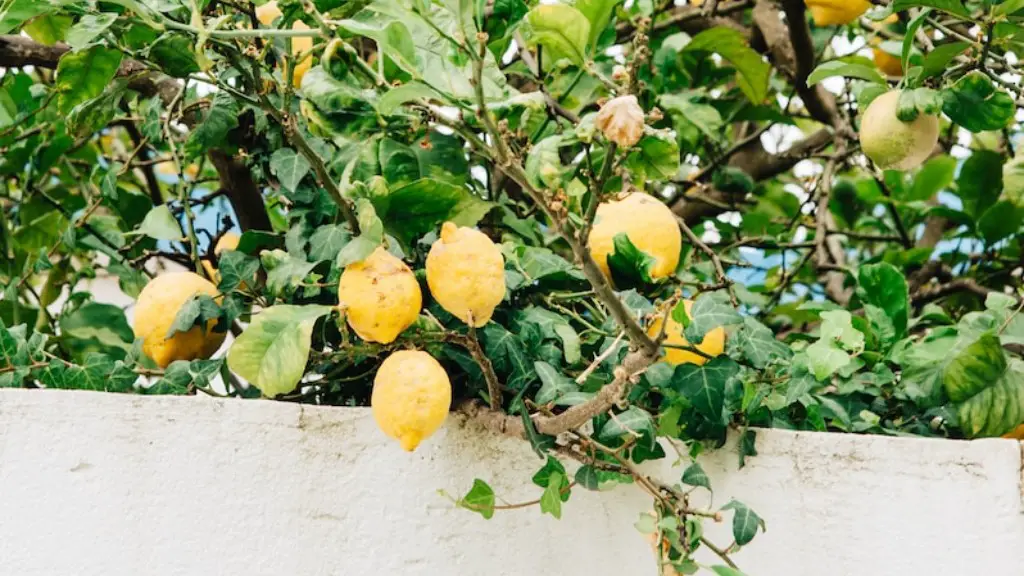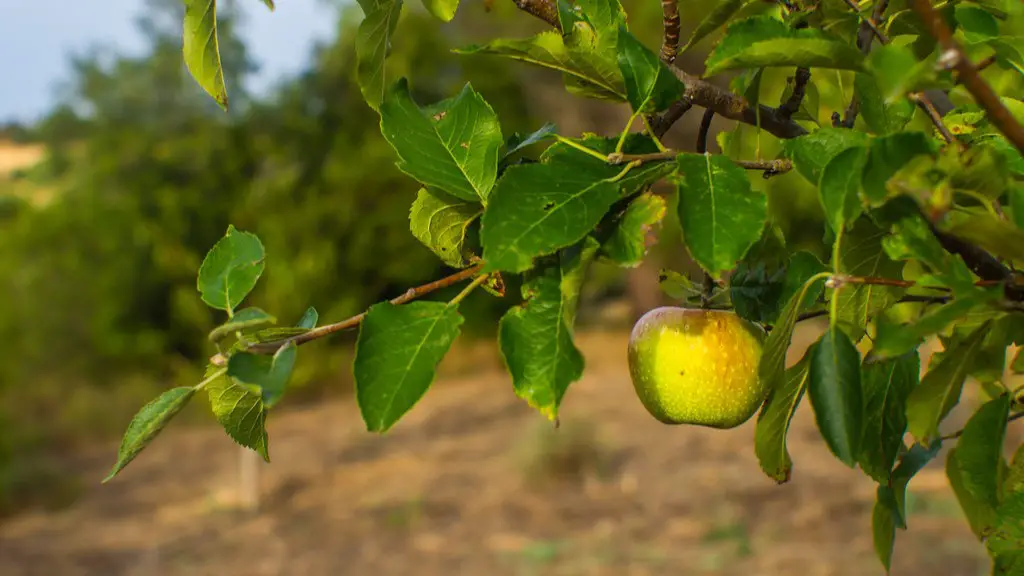Taking care of a lemon tree in a pot is a challenging but rewarding endeavor. Planting your lemon tree in a pot requires regular maintenance and attention. To ensure that your tree is healthy, one of the most important considerations is how to feed the tree. Knowing what to feed your lemon tree in a pot can help to ensure that it grows and produces fruit.
To start, the most important thing your lemon tree needs in the pot is good quality soil. Potting soil should contain a combination of soil, sand, and humus, and should be well-draining to prevent water-logging. Additionally, fertilizer such as a slow-release, general-purpose fertilizer should be added every six weeks. The fertilizer should be worked into the top five inches of soil and watered afterward.
Aside from the soil, it is important to provide your lemon tree with nutrients and other essential elements in order to encourage growth. This can be done through the use of organic, nutrient-rich fertilizers such as compost tea, fish emulsion, and seaweed emulsion. Alternatively, you can use a liquid fertilizer specifically formulated for citrus trees.
In terms of water, your lemon tree should be watered regularly, but not overly so. Too much water can cause root rot and other diseases. Ensure that the soil is not soggy and use mulch to help keep it moist during hot weather.
Sunlight is essential for your lemon tree to photosynthesize and produce energy, so make sure that it is located in a spot in your house or yard that gets at least five hours of direct sunlight each day. The tree should also be pruned regularly to ensure that it grows densely and produces healthy fruit.
Finally, it is important to pay attention to any pests or signs of disease that your lemon tree might be affected by. If you notice any signs of disease, you should remove any affected branches or leaves and treat the disease with a pest-resistant spray or fungicide.
Compost Tea
Compost tea is an optimal source of nutrients for a lemon tree in a pot. Generally, it is made using a teaspoon of high quality compost, steeped in a cup of water. After the mixture has steeped for a few hours, strain off the tea, dilute it with 6-8 cups of water, and use it to water your lemon tree.
Compost tea is a great way to provide your lemon tree with healthy, balanced nutrition. It is made from organic material which is designed to break down over time, releasing essential nutrients such as nitrogen, phosphorus, and potassium. Additionally, it provides beneficial microbes that help the soil to retain moisture and fight off diseases.
Making compost tea is cost-effective and easy to do. Simply fill a bucket with water, add a cup of compost, and mix or stir the two together. If desired, you can add additional nutrients such as kelp meal or worm castings. You can also add a small amount of molasses to help enhance the microbial activity of the tea.
After the mixture has had a chance to steep, strain it and dilute it with additional water. Then simply use the tea to water your lemon tree. Doing this once a month will help to ensure that your tree gets the nutrition it needs to grow and produce healthy fruit.
Fish Emulsion
Fish emulsion is an organic fertilizer with an amino acid-rich formula that is perfect for feeding lemon trees in a pot. A good quality fish emulsion fertilizer should contain a combination of nitrogen, phosphorus, and potassium to provide essential nutrients to the tree. Additionally, fish emulsion contains beneficial fish oil which helps to keep your tree healthy and can discourage pests.
When using fish emulsion fertilizer, it’s important to dilute it before applying it to your lemon tree. Generally, a good ratio to aim for is one part fertilizer to 10 parts water. Mix the two solutions together and use it to water the tree. Apply the solution every two weeks throughout the growing season and make sure to water the soil thoroughly afterward.
Additionally, you can apply a fish emulsion fertilizer directly to the soil around the tree. However, be sure to avoid getting the fertilizer directly onto the tree. Doing so can burn the leaves, causing them to become yellow or discolored.
Fish emulsion is a great way to provide your lemon tree with essential nutrients while also fostering healthy microbial activity in the soil. It’s easy to apply and will help your tree to grow and produce healthy fruit.
Seaweed Emulsion
Seaweed emulsion is a nutrient-rich fertilizer that provides a wide range of benefits to lemon trees in a pot. Generally, it is made with ocean-sourced seaweed and contains a combination of nitrogen, potassium, phosphorus, and micronutrients, making it an ideal choice for feeding your lemon tree.
When using seaweed emulsion, it’s important to dilute it before applying it to your tree. Generally, a good ratio to aim for is one part seaweed emulsion to 10 parts water. Mix the two solutions together and use it to water the tree. Apply the solution once a week throughout the growing season and make sure to water the soil thoroughly afterward.
Additionally, you can apply a seaweed emulsion directly to the soil around the tree. However, be sure to avoid getting the fertilizer directly onto the tree. Doing so can burn the leaves, causing them to become yellow or discolored.
Seaweed emulsion is an effective way to provide your lemon tree with essential nutrients while also promoting healthy microbial activity in the soil. Doing this once a week throughout the growing season will help ensure that your tree gets the nutrition it needs to grow and produce bountiful amounts of healthy fruit.
Mulch
Mulch is an important component of caring for lemon trees in a pot as it helps keep moisture in the soil and prevent water-logging. Ideally, use a two-to-four-inch layer of mulch over the soil. Doing this will help retain moisture and maintain a steady temperature in both hot and cold climates.
Mulch can be purchased in a variety of materials such as straw, hay, bark, compost, or shredded leaves. It is important to choose the right type of mulch for your climate. For example, straw or hay are great for cold climates as they help insulate the soil, while a bark mulch is better in warmer climates as it helps to keep the soil cool.
Mulching around your lemon tree is essential for optimal growth and health. Not only does it help keep the soil moist, but it also adds organic matter which adds nutrients to the soil. Additionally, it helps to prevent weed growth, which can compete with your tree for resources.
In order to ensure that your lemon tree is getting the nutrition it needs to thrive, be sure to add a layer of mulch around it. Doing this will help keep the soil sick and provide essential nutrients to your tree.
Pruning
Pruning is an important component of caring for a lemon tree in a pot. It helps to ensure that the tree grows densely and produces healthy fruit. Pruning also helps to enhance its overall appearance and maintains the structural integrity of the tree.
In order to prune your lemon tree, you will need to use sharp pruning shears and be sure to wear gloves. Start by removing any dead, dying, or overly thick branches. It is also important to remove any branches that are crossing or growing too close together. Doing this will ensure that the tree has plenty of room to grow and produce fruit.
Once the dead, dying, and overly thick branches have been removed, you can begin pruning for shape. Prune off any branches that are too long, as well as any branches that are not positively growing. This will help to promote an aesthetically pleasing shape for the tree.
Pruning is essential for your lemon tree’s health and development. It helps to maintain the structural integrity of the tree and encourages efficient fruit production. Additionally, pruning helps to enhance the trees overall appearance and encourages healthy growth.
Pests and Diseases
Understanding and identifying any signs of pests or diseases that your lemon tree may be affected by is important for its health and growth. Common pests to watch out for include mealybugs, spider mites, and whitefly. If your tree is affected by pests, it is important to remove any affected branches or leaves as soon as possible.
In order to prevent pests or diseases, make sure that your lemon tree is planted in a well-draining pot with nutrient-rich soil. Make sure to use mulch to keep the tree’s soil moist and avoid water-logging. Additionally, you can use a pest-resistant spray or fungicide to discourage pests or treat diseases.
Additionally, pay attention to any yellowing or discoloration of leaves. This can be an indication of nutrient deficiency or other health issues. If you notice these signs, inspect your tree and treat it with a fertilizer designed specifically for citrus trees.
Pests and diseases can cause serious damage to your lemon tree. It is important to be on the lookout for any signs of pests or diseases and take steps to address them as soon as possible. Doing this will help ensure that your lemon tree is healthy and produces plentiful fruits and leaves.


